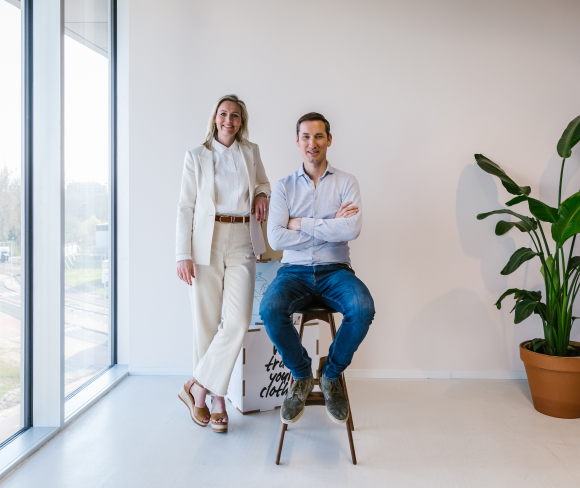The fashion industry has faced criticism over how its supply chains operate. Although they may
want more transparency, brand owners and retailers have never had an effective way to achieve
that. Change has arrived with supply chain transparency platform tex.tracer.
It gives brand owners the insights they need to act upon and with the click of a button report
to all stakeholders. By scanning a QR code on a garment with their mobile, consumers can also
trace the garment’s history.
Challenge
To bring transparency to the fashion supply chain and enable both brands and consumers to act based on facts.
Solutions
- Developed a transparency platform called tex.tracer
- Engaged Fujitsu for Blockchain development and managed services
Outcomes
- Brand owners and retailers now have insight into their supply chains which makes them prepared for future due diligence legislation
- Consumers can scan QR codes in-store to check the garment’s journey
- Social and environmental issues can be revealed and mitigated
Verified supply chain transparency is the key to create a future-proof apparel industry. tex.tracer collects verified data which empowers brands and retailers to act based on facts and mitigate issues so they can create a sustainable ecosystem.
Jolanda Kooi, Co-Founder and CEO, tex.tracer
About the customer
tex.tracer is the brainchild of Jolanda Kooi and Bart Westerman who gleaned extensive industry experience working in China and Hong Kong.
Applying technology to supply chain reporting
tex.tracer Co-Founder and CEO, Jolanda Kooi and Co-Founder and COO, Bart Westerman joined forces with a mutual wish to make their industry more sustainable.
“We became Fairtrade and Global Organic Textile Standard (GOTS) certified,” says Westerman.“We were hoping that with these licenses we could contribute to the necessary changes in our industry, but it did not work out fast enough. Although the Fairtrade and GOTS certification process gave us a good insight into the supply chain, they are limited to organic cotton fibers, and it takes time to process the information through the systems in place. We thought with present-day technology it should be possible to track any kind of material and do it in real-time.”
When they started drawing the outline for tex.tracer in 2018, they realized that simplicity should be key and that the platform should collect reliable supply chain data for the apparel industry, and that as something that it could apply to any other supply chains.
Comprehensive line-up of verification checks
The platform build started in 2019. In tex.tracer, information is obtained from brand owners when they register a garment and the system automatically emails companies down the supply chain. The data is verified using mobile geolocation, time stamps and digital handshakes,certification, and automated checks. If anomalies are detected, the system will not accept the data entry. An important part was that once verified, the data needed to be stored in a decentralized database that would ensure privacy,trustworthiness, and credibility.
Blockchain was the answer. It provides a public electronic ledger that can be openly shared among disparate users to create an unchangeable record of transactions with each entry time-stamped and linked to the next one. tex.tracer needed expert help and turned to Fujitsu.
Fujitsu has been globally active in Blockchain technology since 2015 when it was an early member of the Hyperledger project. This open-source community is focused on developing stable frameworks for enterprise-grade Blockchain deployments.
“Frederik de Breuck at Fujitsu gave us a good insight into the possibilities and how others were using Blockchain,” says Kooi. “Blockchain is the basis of the whole tex.tracer structure. Once data is entered it cannot be changed. If a mistake is made you can add additional information, but the mistake will always be visible.
Managed service for future development
The Fujitsu team in Brussels started with a five-day audit, then progressed to a 15-day paper-based road mapping exercise. tex.tracer was kept in daily contact as action moved to India where a development team built the core Blockchain platform with all the required cloud, internet, and security interactions. Fujitsu now has an ongoing managed service agreement for the platform and supports developments.
Following a soft launch at the start of 2021, the platform since has traced over 30 million items for over 120 brands and is in direct contact with over 1500 active supply chain partners.
“We value our relationship with Fujitsu because they put our business needs first and then use technology as the enabler, not the driver,” says Kooi. “We are the go-to transparency platform for the fashion industry and are keen to continue working with Fujitsu for the foreseeable future."







